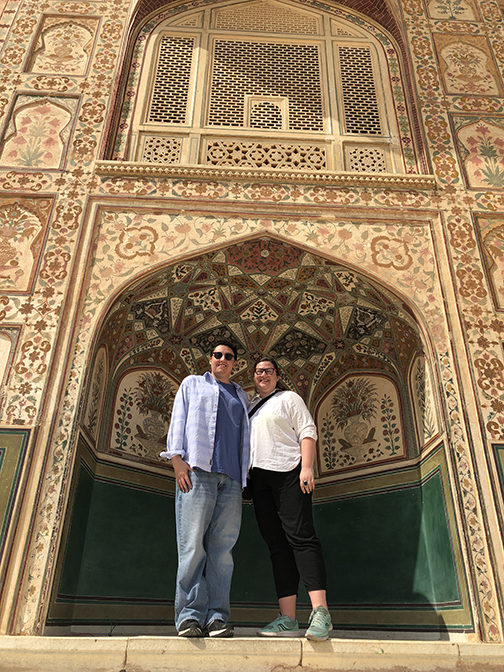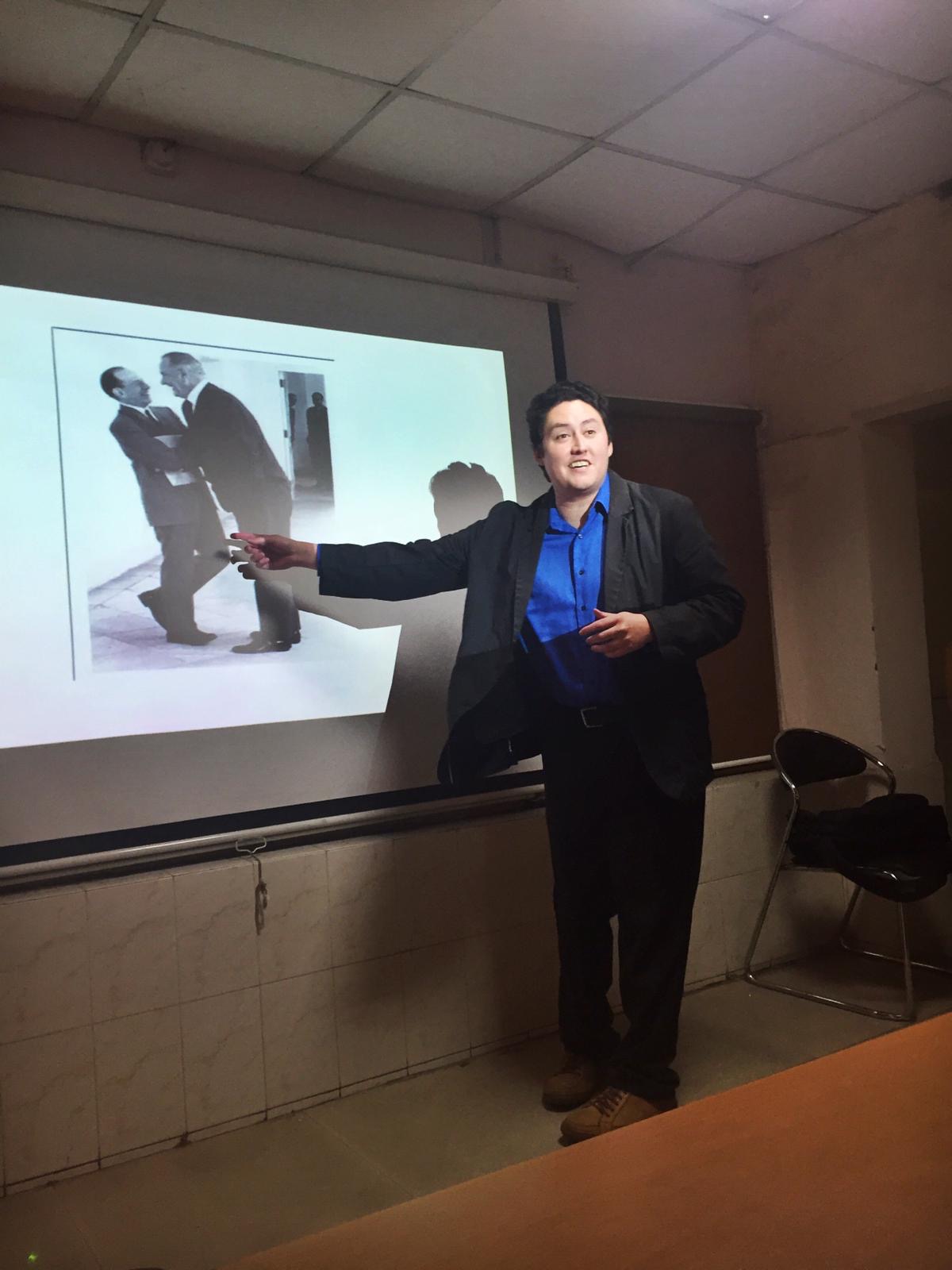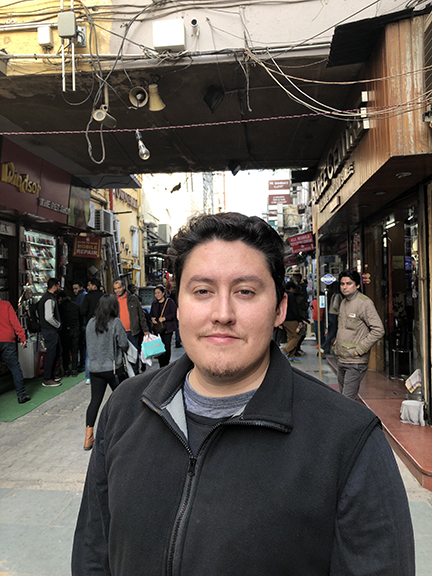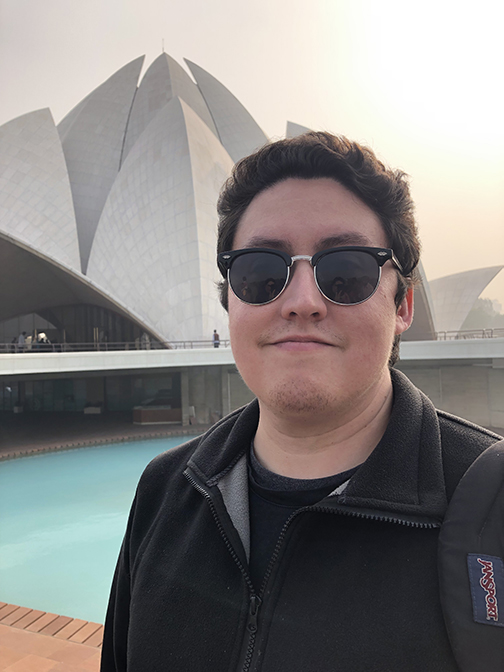History Department: You also won the Fulbright-Nehru Fellowship in 2018-2019. Tell me about that.
Reyes: I had a Fulbright to India (He also was awarded a Critical Language Scholarship and the Boren Fellowship but turned both awards down.) My wife also went because the Fulbright to India offered spousal support.
I did research at the National Archives of India and spent a lot of time at The Nehru Library. The library is home to the papers of India’s first prime minister, Jawaharlal Nehru. It’s also a library and museum of India’s first generation of leaders, as well as key figures involved in the Indian nationalist movement. That’s where I found a lot of interesting papers and oral histories, as well as literature on India from the 19th century to today. It’s a great library, but I also did research at the Institute for Defense Studies and Analysis and Indian Council for World Affairs.
Libby and I were based in New Delhi, but we saw a lot of the country. India is always going to be an important place for us. We have our Indian friends and family. We keep in touch with them, and we still reach out to them when we hear news of things going on in India. I look forward to taking our son there.
History Department: What advice do you have for other students who may be considering a history degree or who are already in our program as they advance to master’s or PhD degrees?
Reyes: I would say think about what you want to do with that degree. Do you want to teach? Do you want to work in a museum? Do you want to work in an archive? Do you want to work in a library? There are lots of jobs historians do that do not require a PhD. You may need a Master’s or something else, but not a PhD.
Also, when you go to apply for advanced degrees, make sure there are a lot of good people for you to work with. You don’t want to go to a place that has just one faculty member you can work with. Find a place that has a decent amount of faculty to work with, enough to create a future exam or dissertation committee.
There are lots of rewarding pathways to meaningful work. Just be open to any type of future history position. Find something that’s interesting and meaningful and challenging to you.
History Department: So, what’s next for you? What do you have planned for after graduation?
Reyes: I’m going to finish my dissertation and find a full-time job. I haven’t applied for a permanent teaching position, though I have looked at some jobs. There is a postdoctoral fellowship I want to apply for this year. I’m really open to whatever the future holds, and if I can continue to work with students and to teach in some fashion, I think that’s all I’m looking for.
Also, there’s an article I’m trying to finish based on my master’s thesis about the politics of gratitude and U.S. food aid to India. And once I finish my dissertation, I’d love to turn that into a book.
History Department: Anything else you’d like to add?
Reyes: I’m an editor and co-founder of Contingent Magazine. We are a history-focused news magazine that publishes new articles about every week. We operate as a nonprofit organization. We only publish people who are off the tenure track or nontenured scholars, so we publish a lot of librarians and archivists and graduate students, independent scholars, adjunct instructors. We’ve actually had people I know from Mizzou who published with us.
We publish all sorts of historical work including comics and photo essays. We believe that historians should be paid for their work. Everyone who writes for us is paid. Everybody who edits is paid. Everybody who does consulting work for us is paid. Everyone. We won’t approve a pitch or publish something unless we can guarantee that we can pay somebody and that’s one of my favorite things, when I can write a check or transfer money to a hardworking scholar.
We are looking for all sorts of interesting articles, so if you want to pitch something, go to the How to Pitch Us page on our website. Right now, we are open for pitches. We pay $500 for features, $250 for field trips and reviews, $100 for mailbag. It’s enjoyable to work on such different articles, some of which I know a lot about, some of which I don’t. For instance, the last piece I edited was about female playwrights in the Progressive Era. I know very little about arts and culture in the Gilded Age, but it was a great piece, and I learned a lot about the topic from editing it.




